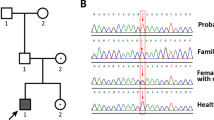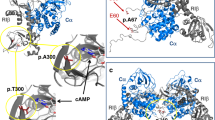Abstract
Using targeted exome sequencing, we identified mutations in NNT, an antioxidant defense gene, in individuals with familial glucocorticoid deficiency. In mice with Nnt loss, higher levels of adrenocortical cell apoptosis and impaired glucocorticoid production were observed. NNT knockdown in a human adrenocortical cell line resulted in impaired redox potential and increased reactive oxygen species (ROS) levels. Our results suggest that NNT may have a role in ROS detoxification in human adrenal glands.
This is a preview of subscription content, access via your institution
Access options
Subscribe to this journal
Receive 12 print issues and online access
$209.00 per year
only $17.42 per issue
Buy this article
- Purchase on Springer Link
- Instant access to full article PDF
Prices may be subject to local taxes which are calculated during checkout

Similar content being viewed by others
References
Clark, A.J. et al. Best Pract. Res. Clin. Endocrinol. Metab. 23, 159–165 (2009).
Metherell, L.A. et al. Nat. Genet. 37, 166–170 (2005).
Metherell, L.A. et al. J. Clin. Endocrinol. Metab. 94, 3865–3871 (2009).
Arkblad, E.L. et al. Free Radic. Biol. Med. 38, 1518–1525 (2005).
Toye, A.A. et al. Diabetologia 48, 675–686 (2005).
Freeman, H. et al. Biochem. Soc. Trans. 34, 806–810 (2006).
Yin, F., Sancheti, H. & Cadenas, E. Biochim. Biophys. Acta 1817, 401–409 (2012).
Dezso, Z. et al. BMC Biol. 12, 49 (2008).
Su, A.I. et al. Proc. Natl. Acad. Sci. USA 99, 4465–4470 (2002).
Walker, J.R. et al. Genome Res 14, 742–749 (2004).
Cooray, S.N. et al. Endocr. Dev. 13, 99–116 (2008).
Hirano, M. et al. Proc. Natl. Acad. Sci. USA 103, 2298–2303 (2006).
Storr, H.L. et al. Mol. Endocrinol. 23, 2086–2094 (2009).
Huebner, A. et al. Mol. Cell. Biol. 26, 1879–1887 (2006).
Acknowledgements
We would like to thank J. Altmüller for running samples on a Genome Analyzer IIx, G. Nürnberg for performing the linkage analysis and the NHLBI GO Exome Sequencing Project and its ongoing studies, which produced and provided exome variant calls for comparison, including the Lung GO Sequencing Project (HL-102923), the Womens Health Initiative (WHI) Sequencing Project (HL-102924), the Broad GO Sequencing Project (HL-102925), the Seattle GO Sequencing Project (HL-102926) and the Heart GO Sequencing Project (HL-103010). This study was approved by the Outer North East London Research Ethics Committee (09/H0701/12). Affected individuals and/or their parents gave written informed consent to DNA studies at the outset of the study. This work has been supported by the Medical Research Council UK (New Investigator Research Grant G0801265 to L.A.M., Clinical Research Training Fellowship Grant G0901980 to C.R.H. and Project Grant G0700767 to P.J.K.).
Author information
Authors and Affiliations
Contributions
L.A.M., A.J.L.C., P.J.K. and J.P.C. conceived and designed the experiments and jointly supervised the research. E.M., J.K., L.G., C.R.H., F.W. and L.A.M. performed the experiments. P.N., P.F. and E.M. analyzed the data and performed the statistical analysis. N.P.M., R.B. and H.N.S. contributed reagents and clinical information. L.A.M., A.J.L.C. and E.M. wrote the manuscript.
Corresponding author
Ethics declarations
Competing interests
The authors declare no competing financial interests.
Supplementary information
Supplementary Text and Figures
Supplementary Methods, Supplementary Tables 1 and 2 and Supplementary Figures 1–6 (PDF 3615 kb)
Rights and permissions
About this article
Cite this article
Meimaridou, E., Kowalczyk, J., Guasti, L. et al. Mutations in NNT encoding nicotinamide nucleotide transhydrogenase cause familial glucocorticoid deficiency. Nat Genet 44, 740–742 (2012). https://doi.org/10.1038/ng.2299
Received:
Accepted:
Published:
Issue Date:
DOI: https://doi.org/10.1038/ng.2299
This article is cited by
-
Testicular impairment in Primary Adrenal Insufficiency caused by Nicotinamide Nucleotide Transhydrogenase (NNT) deficiency - a case report: implication of oxidative stress and importance of fertility preservation
Basic and Clinical Andrology (2023)
-
An epigenome-wide analysis of socioeconomic position and tumor DNA methylation in breast cancer patients
Clinical Epigenetics (2023)
-
Reduced nicotinamide adenine dinucleotide phosphate in redox balance and diseases: a friend or foe?
Acta Pharmacologica Sinica (2022)
-
Leukocyte cytokine responses in adult patients with mitochondrial DNA defects
Journal of Molecular Medicine (2022)
-
Genetic aetiology of primary adrenal insufficiency in Chinese children
BMC Medical Genomics (2021)



